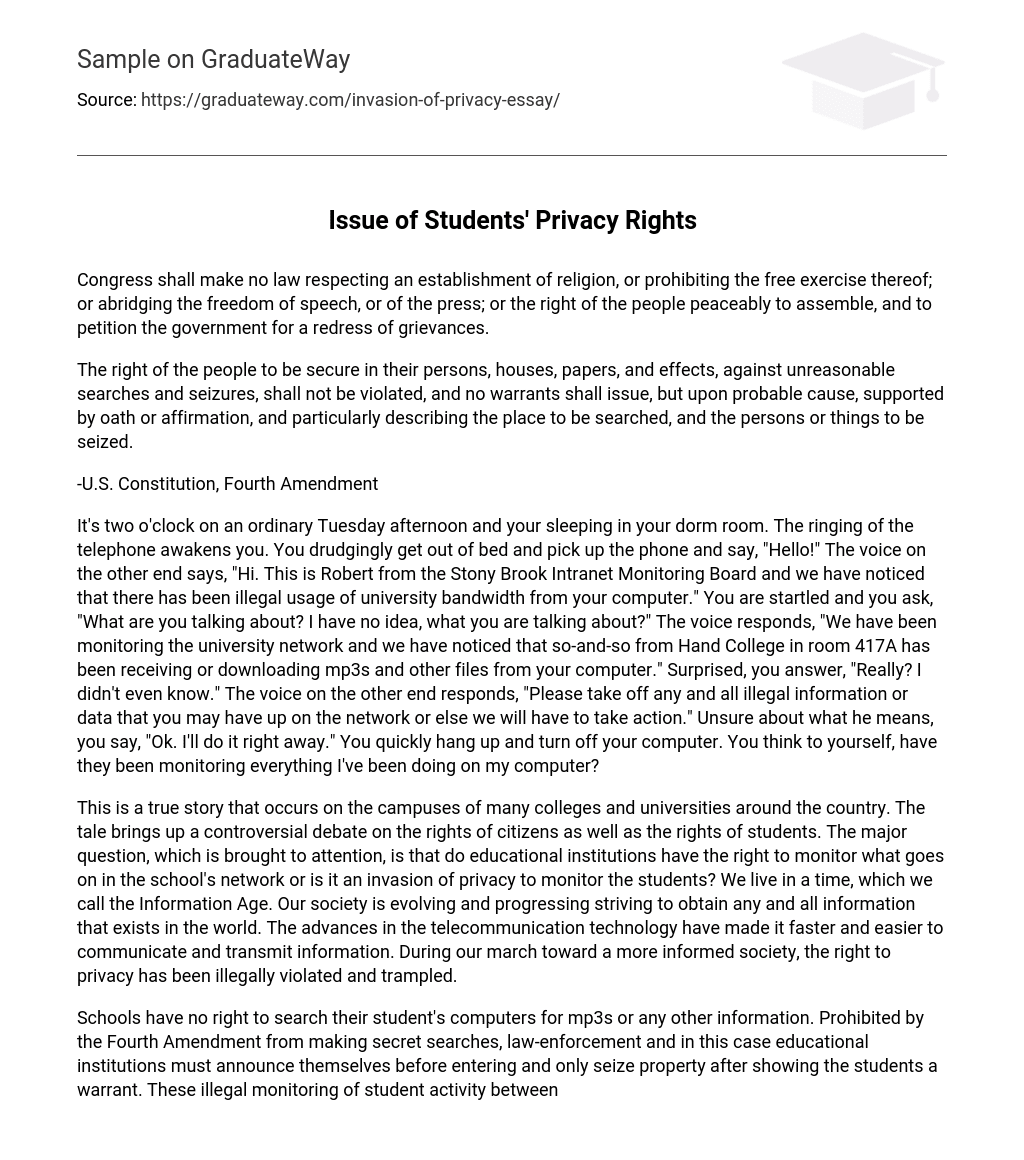Congress shall make no law respecting an establishment of religion, or prohibiting the free exercise thereof; or abridging the freedom of speech, or of the press; or the right of the people peaceably to assemble, and to petition the government for a redress of grievances. The right of the people to be secure in their persons, houses, papers, and effects, against unreasonable searches and seizures, shall not be violated, and no warrants shall issue, but upon probable cause, supported by oath or affirmation, and particularly describing the place to be searched, and the persons or things to be seized.
It’s two o’clock on an ordinary Tuesday afternoon and your sleeping in your dorm room. The ringing of the telephone awakens you. You drudgingly get out of bed and pick up the phone and say, “Hello!” The voice on the other end says, “Hi. This is Robert from the Stony Brook Intranet Monitoring Board and we have noticed that there has been illegal usage of university bandwidth from your computer.” You are startled and you ask, “What are you talking about? I have no idea, what you are talking about?” The voice responds, “We have been monitoring the university network and we have noticed that so-and-so from Hand College in room 417A has been receiving or downloading mp3s and other files from your computer.”
Surprised, you answer, “Really? I didn’t even know.” The voice on the other end responds, “Please take off any and all illegal information or data that you may have up on the network or else we will have to take action.” Unsure about what he means, you say, “Ok. I’ll do it right away.” You quickly hang up and turn off your computer. You think to yourself, have they been monitoring everything I’ve been doing on my computer?
This is a true story that occurs on the campuses of many colleges and universities around the country. The tale brings up a controversial debate on the rights of citizens as well as the rights of students. The major question, which is brought to attention, is that do educational institutions have the right to monitor what goes on in the school’s network or is it an invasion of privacy to monitor the students? We live in a time, which we call the Information Age. Our society is evolving and progressing striving to obtain any and all information that exists in the world. The advances in the telecommunication technology have made it faster and easier to communicate and transmit information. During our march toward a more informed society, the right to privacy has been illegally violated and trampled.
Schools have no right to search their student’s computers for mp3s or any other information. Prohibited by the Fourth Amendment from making secret searches, law-enforcement and in this case educational institutions must announce themselves before entering and only seize property after showing the students a warrant. These illegal monitoring of student activity between computers could be seen as the same thing as eavesdropping on telephone conversations, which is illegal.
Another issue regarding the violation of rights through the monitoring of student activity on the network is that the “overhead” supervision violates First Amendment rights, specifically the freedom of speech and freedom of press. What if the students created websites that contained mp3s on it? These websites would be uploaded on the school’s network but would that give the school the right to censor or monitor what’s being put up on the school’s network? This question brings up concerns of the student’s rights. It should be noted that when student’s create a website, they are actually publishing a website. If the university was to censor or monitor the information being put on the website it would be a violation of a citizen’s freedom of press.
The question that comes up is that does a student lose some of his God-given rights when he becomes a student at a public or private educational institution. Students do have rights but once they have been registered into the universities databases they have to follow the restrictions and guidelines set forth by the school. Since students are placing their mp3s and other data on the school’s network, some argue that schools have the right to monitor or censor what is being placed on their network. Schools may get in trouble for allowing illegal data or illegal use of information to exist on the network. Since students place information and other data on the public university network, anyone has access to the student’s information, other students as well as the administration.
The issue of students’ privacy rights has been a hot topic over the past few months with the recent illegal searches of student computers connected to the university’s computer network at Carnegie Mellon University. Educational institutions have been monitoring the students’ activities on the local university network without the students even realizing it. Although not all colleges and universities have been observing the activities of their students, the thought that they could, is chilling. Next time you send an email to a friend, make sure there aren’t too many inside jokes because your friend may not be the only one reading it.





